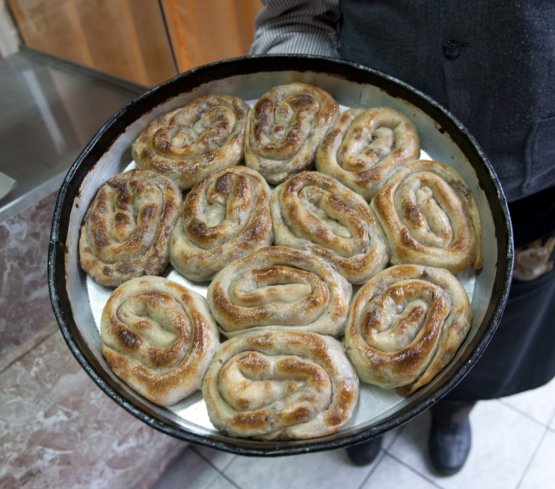The rebirth of a nation or a of people starts with food. This is a fact. Indeed, I have spent 5 days in the non-stop rhythm that goes between the streets and the homes of the people from Bosnia and Herzegovina, and I can affirm this without risking contradiction: in a country we continue to remember for the painful events of twenty years ago, food represents the most authentic symbol of a return to normality, to conviviality. To life.

Burek, a phyllo pastry roll, filled with spiced minced meat, a popular Bosnian snack
In front of the most ancient bakery in Sarajevo, near the
Gazi Husrev-beg mosque, those in a queue to buy the hot
kifle don’t belong to any ethnic group, religion or political party. The daily ritual of these small sandwich snacks – you could eat them by the dozen, without stopping – takes place every day, all day long, regardless of the
Dayton Agreement. And it’s difficult to find a place in the best
buregdžinica in town, the one in front of the Jewish museum, where everyone (with no exception) converges for the always popular
burek with yoghurt. It’s the most widespread street food in Sarajevo, but also the tastiest, according to the
Lonely Planet guide which has included Bosnian burek, a roll made with phyllo pastry filled with spiced minced meat, in the 2012 edition of the “World’s Best Street Food” guide.
It hardly surprises us that, in a nation in which beer rules (and in which you are “identified” according to the one you drink), wine is represented instead by
Osman Pirija, a Muslim agronomist who in the Sixties greatly promoted viticulture between Stolac and Mostar. Or by the Daorson Cooperative, created thanks to a project of the Ministry of Foreign Affairs with the support of the NGOs
Oxfam Italia and
Cefa. Its members - 8 altogether – are Serbians, Bosniacs (Bosnian Muslims) and Croatians. Or by some Orthodox monks from the Tvrdoš monastery, who today produce one of the best wines from the local grape variety Vranac and boast many international awards.
They have been called the “raspberries of peace”, instead, the products picked by
Cooperativa Insieme in Bratunac, formed by a group of Serbian women, Orthodox and Muslim: widows, orphans and victims of the crimes in Srebrenica, today simply entrepreneurs, workers, agronomists and farmers who are committed to the common good. Nor are we surprised if the refiner of the Liubuški ham, in Croatian Herzegovina, buys hams up in the north of Bosnia, in the
Republica Srpska. «Food, good food that is, knows no frontier» he confides. And these frontiers are invisible: they have to point them out while you’re traveling, otherwise you won’t recognise them: what you notice, instantly, is the very close relationship between the people and the ground on which they work.
1. to be continued